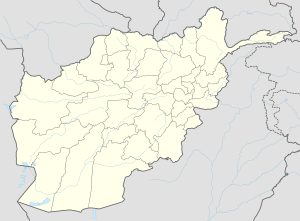Atta Muhammad Nur (also spelled Ata Mohammed Noor,, served as the Governor of Balkh Province in Afghanistan from 2004 to January 25, 2018. An ethnic Tajik, he worked to educate the Mujahideen after the 1979 Soviet invasion of Afghanistan, gaining the nickname "The Teacher." He then became a mujahideen resistance commander for the Jamiat-e Islami against the Soviets.

Sholgara is a district in the southern part of Balkh Province, Afghanistan. Sholgara, just south of Mazari Sharif (Mazar), is strategically located at the crossroads between several districts: Sangcharak, Kishindih, Dar-I-Suf. Dar-I-Suf and Sangcharak are known for their resistance to the Taliban insurgency. It is commonly said that "who holds Sholgara, holds Mazar".

Zari is a district in Balkh Province, Afghanistan. It was created in 2005 from part of Kishindih District.

Charkint, or Chahar Kint, is a district in Balkh Province, Afghanistan. It has a population of 32,306. The district administration is located in Shar Shar area of Charkint district, which means "four clusters/towns" - from Persian chahār, "four", and Sogdian kand, "town". The area of the district is 1,357 square kilometres (524 sq mi).

Chārbōlak district is located in the western part of Balkh Province. Its capital is the village of Charbolak, 40 km northwest of Mazari Sharif. The majority of the population is Pashtun.

Chimtal District also Chemtal or Chamtal is located in the western part of Balkh province, Afghanistan. The estimated population of Chimtal in 2004 was around 81,311, with Pashtuns being predominant. The capital is Chimtal.

Dawlatabad District is located in the northwestern part of Balkh province, Afghanistan. The population is 101,900 people. The capital is the city of Dawlatabad at 298 m height above the sea level.

Dihdadi District is situated in the central part of Balkh province, Afghanistan. It is not far from the capital of the province Mazari Sharif - about 15 km in eastern direction from the district capital Dihdadi.

Kaldar is a small district in the northern part of Balkh Province, Afghanistan. The northern and the eastern border of the district is the large Amu Darya river. North of the river is Uzbekistan and east is Tajikistan. The main village, also called Kaldar, is in the northeastern part of the district, close to the river.

Kishindih or Kishindeh district is the southernmost district in Balkh province. Its capital is Kishindinh Bala, situated in the northern part of the district.

Marmul is a small district, located in the central part of Balkh Province in northern Afghanistan. The capital Marmul is in its southern end on the border with the Chahar Kint district.

Nahri Shahi or Nahr-e-Shahi is a large district of Balkh Province, Afghanistan around the capital district Mazari Sharif.

Shortepa also Shor Tappeh is one of the 15 districts of Balkh province. Shortepa, a small district in Balkh Province, Afghanistan. It is situated along the Amu Darya river, across the border with Termez, Uzbekistan, and to the east Kaldar. The main village is Shor Tappeh, A at 274 m altitude.
Qarqin District is a small boundary district in the northern part of Jowzjan Province, Afghanistan. It borders Turkmenistan to the north along the Amu Darya River, Khamyab District to the west, Mingajik and Mardyan districts to the south, and Balkh Province to the east. The population is 21,400 (2006). The district center is the town of Qarqin, which is situated on the bank of the Amu Darya River.
Ludin are progenited by Syed Muhammad Masood from his son Allauddin. and settled among the area of Ghurghasht tribe of Pashtuns. They are scattered all over Afghanistan and can be found in most of the major cities. They are the sub tribe of Mashwani.
Kholm District is a district of Balkh Province, Afghanistan. Its capital lies at Kholm.
Feroz Nakhchir District is a district of Samangan Province, Afghanistan. It formerly belonged to Balkh Province and shifted in 2005.




